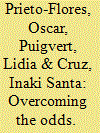| Srl | Item |
| 1 |
ID:
113870


|
|
|
|
|
| Publication |
2012.
|
| Summary/Abstract |
How are different ethnic groups dealing with upward social mobility and assimilation? This is a large question that social research has tried to address in recent decades. In the United States, this issue has been framed by the theory of segmented assimilation. In Europe, regarding the Romà, the assumption still exists that upward mobility paths are intrinsically associated with a loss of ethnic identity, due to a process of full acculturation to the mainstream. In this article, through an analysis of 48 in-depth interviews with middle-class Romà in Spain, we identify other mobility paths, such as selective acculturation, that exist in addition to full acculturation. In this sense, we observe how symbolic differences exist between those middle-class Romà who live in an ethnic enclave and have a strong network of support and those who do not. In most cases, middle-class Romà tend to live outside the enclave and experience what we have called constricted ethnicity.
|
|
|
|
|
|
|
|
|
|
|
|
|
|
|
|
| 2 |
ID:
131960


|
|
|
|
|
| Publication |
2014.
|
| Summary/Abstract |
This article looks at the changing frameworks for the institutional and cultural incorporation of second-generation rural migrants in Shanghai. Beginning in 2008, Shanghai launched a new policy of accepting migrant children into urban public schools at primary and secondary levels. I show that the hukou (household registration) is still a critical social boundary in educational institutions, shaping uneven distribution of educational resources and opportunities, as well as hierarchical recognition of differences between urbanites and migrants. I have coined the term "segmented incorporation" to characterize a new receiving context, in which systematic exclusion has given way to more subtle forms of institutional segmentation which reproduces cultural prejudice and reinforces group boundaries.
|
|
|
|
|
|
|
|
|
|
|
|
|
|
|
|